Events and outputs
'Who Will Be The Prisoners of Tomorrow?' Workshop
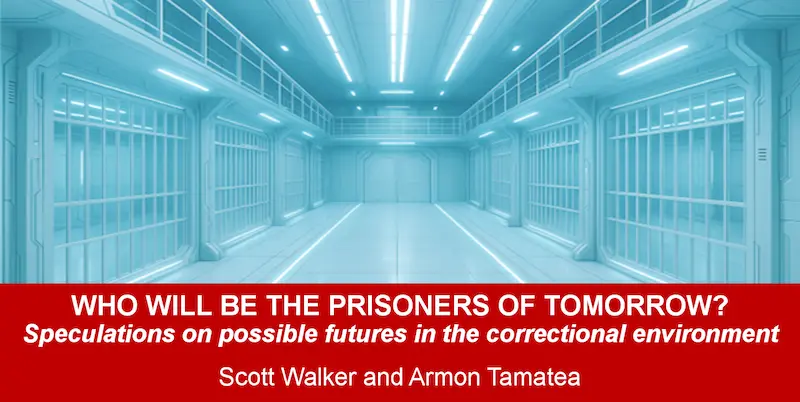 Delivered in partnership with the Department of Corrections, the New Zealand Police, the University of Waikato and Nga Tūmanakotanga.
Delivered in partnership with the Department of Corrections, the New Zealand Police, the University of Waikato and Nga Tūmanakotanga.
Held on 17th September 2025, students from across the University of Waikato were invited to participate in an interactive workshop alongside the Department of Corrections Custodial Leadership team and the New Zealand Police.
The workshop covered topics such as generational differences, social agency, understanding the future of learning and preparing for the future workforce.
As a psychology student hoping to work in Corrections one day, I just wanted to say what an incredible workshop this was. I really valued the wide range of voices and the openness of the discussion, especially the contributions from Corrections staff who shared their perspectives from different prisons and roles. Those insights added so much depth and made the whole experience both thought-provoking and inspiring. I also had the chance to meet some amazing people that I hope to work alongside in the future and enjoyed some great conversations along the way. Big mihi to everyone involved in putting this together. I hope there will be many more events like this in the future
Preventing Prison Violence Book Launch
On 20th March 2024, a special event was held at the University of Waikato campus, to celebrate the launch of Preventing Prison Violence: An Ecological Perspective.
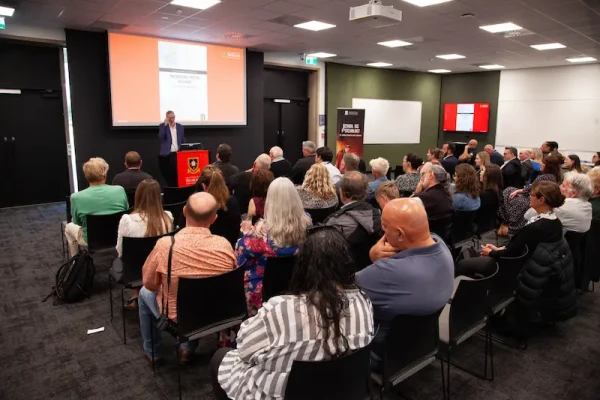
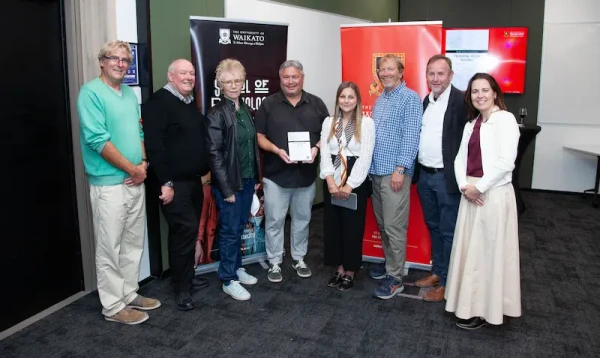
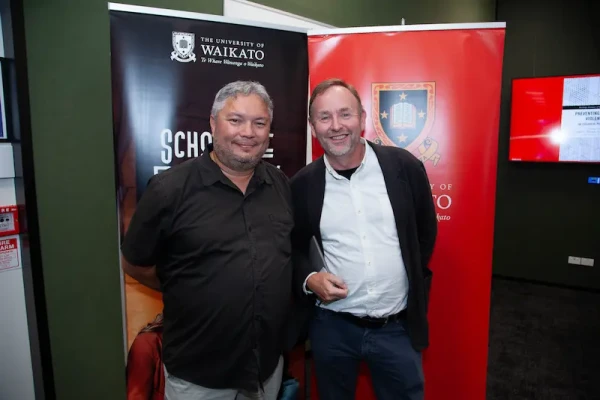
Edited by three members of the Nga Tūmanakotanga project team, Preventing Prison Violence introduces the idea of ‘prison ecologies’ – a multi-layered perspective to understanding prison violence as a ‘product’ of human, environment (social and physical), systemic, and societal influences – and how an ecological approach is helpful to prevention efforts.
Prisons are like hospitals and schools… and marriages. They are state-regulated, characterised by a notion of containment, promote growth (if healthy), and involve negotiations of power. It could also be said that each of these exemplars is an institution of care.
Introduction: Steps to an Ecology of Prisons
Armon Tamatea, Andrew Day & David Cooke
A safe prison is a prison that has the best chance of delivering the outcomes that the community expects. We cannot expect people to change their behaviour if we house them in environments that are unsafe.
Violence in Prisons: What Have We Learned So Far?
David Cooke, Andrew Day & Armon Tamatea
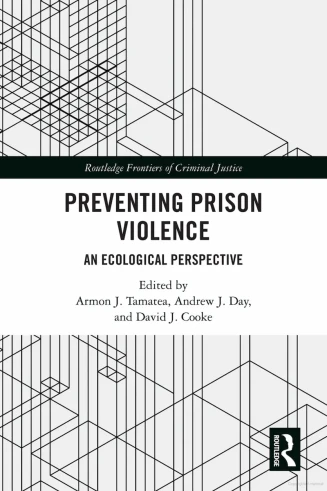
Providing a comprehensive resource for those who are interested in making prisons safer; firmly based in contemporary research and theory, Preventing Prison Violence will be of great interest to students and scholars of Penology, Violence and Forensic Psychology, as well as to professionals working in criminal justice settings.
The book is now available open access. Download or read online free of charge, at Taylor & Francis Group.
If you would like to purchase a hard copy, you can do so through Routledge.com.
Rice, S., Day, A., Briskman, L., & Jamieson, S. (Eds.) (2025). Social Work: In the Shadow of the Law 6th Ed. Annandale NSW, The Federation Press.
Woldgabreal, Y., Day, A., & Leach, C. (2025). Building the strengths of justice-involved people: A dual-continua model of trauma-informed interventions. In L. Jones, P. Willmott, A. Mahoney, & G. Ackerman (Eds.), Interventions with People who have Offended with Trauma Histories. Routledge.
Malvaso, C. G., Day, A., Robinson, L. (2025). Opportunities for progressing trauma-informed youth justice case management through co-production principles. In S. Creasey & S. Burns (Eds.), Coproduction and Youth Justice. Routledge.
Day, A., Tilley, C., & McLachlan, K. (2025). Military service and criminal justice system involvement: A trauma-informed perspective. In Y. Woldgabreal, A. Mia, D. Morris, and C. Williams (Eds.), Diversity in Trauma-informed Forensic Practice: Adapting Interventions. Routledge.
Cooke, D.J. (2024). A Psychologist’s Recollections of the Barlinnie Special Unit. In M. Nellis (Ed.), Barlinnie Special Unit: a landmark in penal reform. Waterside Press: Hook.
Cooke, D.J. (2024). The Ecology of Institutional Violence: Understanding and Intervening. In C. Logan & L. Johnstone (Eds.), Managing clinical risk: A guide to effective practice. Routledge. (2nd Edition).
Tamatea, A., Day, A., & Cooke, D. (Eds.). (2023). Preventing Prison Violence: An Ecological Perspective. Routledge. *Available as Open Access - download or read online at Taylor & Francis Group.
Galouzis, J., Day, A., Ross, S., & Johns, D. (2023). Designing a rehabilitative prison environment. In D. Moran, Y. Jewkes, K.-L. Blount-Hill and V. St.John (Eds.), What Works in Custodial Design?
Walters, M., Kukatai, T., Gonzales, A., & Henry, R. (Eds.) (2023). Handbook of Indigenous Sociology. Oxford: Oxford University Press.
Henry, R. (2023). Indigenizing the Sociology of Gender. In Walters et al., (Eds.), Handbook of Indigenous Sociology. Oxford University Press.
Henry, R. (2023). Social Systems and the Indigenous Lifeworld: Examining Gerald Vizenor’s Notion of Survivance in Street Lifestyles. In Walters et al., (Eds.), Handbook of Indigenous Sociology. Oxford University Press.
Clifford, A., & Henry, R. (2022). Targets of Assimilation: Indigenous Women’s Experiences of Whitewashing in a Healing Lodge. Reading Sociology 4th Edition.
Day, A., & Halsey, M. (2022). The relationship between desistance and forensic practice. In C. M. Langton and J. R. Worling (Eds.), The Wiley Handbook of Offender Desistance from Aggression and Crime: Theory, Research, and Evidence-Based Practice. Wiley & Sons.
Cooke, D.J. (2022). Psychopathic Personality Disorder. In J. Brown & M. Horwath (Eds.), Cambridge Handbook of Forensic Psychology (pp. 369-387).
Walters, M., Kukatai, T., Gonzales, A., & Henry, R. (2022). Introduction: Handbook of Indigenous Sociology. In Walters et al., (Eds.), Handbook of Indigenous Sociology. Oxford University Press. https://doi.org/10.1093/oxfordhb/9780197528778.001.0001
Henry, R. (2022). Survivance and Indigenous Lifeworlds. In Walters et al., (Eds.), Handbook of Indigenous Sociology. Oxford University Press.
Day, A., Woldgabreal, Y., & Butcher, L. (2022). Cultural bias in forensic assessment: Consideration and suggestions. In G. Liell, L. Jones, and M. Fisher (Eds.), Challenging Bias in Forensic Psychological Assessment and Testing. Taylor and Francis.
Day, A., & Halsey, M. (2022). The relationship between desistance and forensic practice. In C. M. Langton and J. R. Worling (Eds.), The Wiley Handbook of Offender Desistance from Aggression and Crime: Theory, Research, and Evidence-Based Practice. Wiley & Sons.
Amber, Bev, Chantal, Jazmyne, Faith, Jorgina, and Henry, R. (2022). Indigenous women and street gangs: Survivance narratives. University Alberta Press.
Day, A., & Tamatea, A. (2021). The politics of actuarial justice and risk assessment. In Sellers, Brian, Arrigo & Bruce (Eds.), The pre-crime society: Crime, culture and control in the ultramodern age. Bristol University Press. https://doi.org/10.2307/j.ctv1rnpjdp
Day, A., Ross, S., & Polaschek, D. (2021). Australia and Aotearoa New Zealand - challenges and opportunities for the prevention of intimate partner violence. In S. Stith and C. M. Spencer (Eds.), International Perspectives on Intimate Partner Violence: Challenges and Opportunities (Chapter 11). Springer Brief. https://doi.org/10.1007/978-3-030-74808-1
Polaschek, D., Day, A., & Hollin, C. (2019). The Wiley International Handbook of Correctional Psychology. Wiley.
Tamatea, A. (2025). “We must remember, these people's history follow them”: Māori, marginality and the complex needs of gang communities in Aotearoa New Zealand [Keynote address]. Complex Needs Conference, Melbourne, March 2025.
Cooke, D.J. (2024). Psychopathic Personality Disorder: Controversies and Challenges. Invited address at the University of Erlangen-Nuremberg, Erlangen, July 2024.
Barr, C.J.S., Docherty, P.D., Grace, R.C., Growns, B., Cording, J., & Erdelyi, O. (2025). Balancing Performance, Fairness, and Explainability in Recidivism Prediction: A Comprehensive Evaluation of Machine Learning Prediction Models, EPC/APCV 2025, Sydney, June 2025.
Brabyn, L. & Tamatea, A. (2024). The use of machine learning for understanding prison violence in New Zealand, 35th International Geographical Congress, Dublin, August 2024 .
Brabyn, L., Tamatea, A. & Cooke D. (2024). The application of Geographical Information Systems (GIS) and mapping for helping to understand prison violence. NZ Geographical Society Conference, Tauranga, November 2024.
Tamatea, A., & Day, A. (2024). Understanding the complexity of prison violence: An ecological perspective of institutional aggression in Australia. Stockholm Criminology Symposium. Stockholm, Sweden.
Tamatea, A. (2024). "Smashed him in the face...and then I felt sorry for him": An ecological perspective of prison violence in Aotearoa New Zealand (Community and Academic Perspectives-Carceral Sphere; R. Henry, Chair). Native American and Indigenous Studies Association's Thirteenth Annual Conference. Bådåddjo, Norway.
Henry, R. (2024). More than a Voyeur: Engagement with Indigenous Peoples in Street Lifestyles. 20th Biennial Symposium on Violence and Aggression. Saskatoon, Canada.
Polaschek, D. (2023). Ara Poutama Aotearoa Psychological Services National Training Event. New Zealand.
Polaschek, D. & Clarke, A. (2023). Improving Prediction of Potential for Treatment Completion at Tai Aroha. New Zealand.
Tamatea, A., Polaschek, D., Taaka, S. (2023). Correctional Staff Perspectives of Violence and Safety. New Zealand.
Henry, R. (2023). Taking a Picture is More Than a Click: Indigenous
Street Gangs and Photovoice. American Society of Criminology. Philadelphia, USA.
Henry, R. (2023). Indigenous Engagement Platform and Substance Research. Native Counselling Services of Alberta. Alberta, Canada.
Henry, R. (2023). Moving Beyond Substance Pathology to Examine Addictions with Indigenous Street Gang members. Native Counselling Services of Alberta. Alberta, Canada.
Henry, R. and Huel, C. (2022). Indigenous Women and Street Gangs. File Hills Treaty Four Justice Symposium, Online
Henry, R. (2022). Collaborative Masculinities. Roundtable, Online.
Tamatea, A. (2022). Impact of gangs on reintegration and behaviour change. Introducing the GHRO Evaluation. Gang Harm Reduction Officer (NZ Police) Hui, Maungatapu.
Tamatea, A. (2022). Towards an Ecological Understanding of Prison Violence. Forensic Psychology Student Conference, Victoria University of Wellington. Online.
Tamatea, A. (2022). Understanding prison violence in Aotearoa: An ecological view. Ara Poutama Senior Health Management Bi-Monthly meeting. Wellington, NZ. Online.
Tamatea, A. (2022). Behind the Bars: Understanding troublesome contexts, people, behaviour and knowledge in New Zealand prisons. Te Wānanga o Aotearoa: Education Services – Corrections, National Wānanga. Online
Brabyn, L., Grace, R., & Tamatea, A. (2021). Prison violence and the social environment: A New Zealand case study. International Corrections and Prisons Association Conference, online.
Tamatea, A., & Henry, R. (2021). Violence is currency: Understanding gang violence in prison. International Corrections and Prisons Association Conference, online.
Brabyn, L. and Grace, R. (2021). Prison violence: What the data is telling us. Te Whanake, Understanding prison violence in Aotearoa II.
Brennan-Tupara, N.D. (2021). Towards a descriptive theory of institutional gang violence. Waikato-Waitaha Conference 2021. Online.
Brennan-Tupara, N.D. (2021). Building a descriptive theory of institutional gang violence. Ara Poutama Aotearoa/Department of Corrections National Training Event 2021, research forum. Online.
Henry, R. & Tamatea, A. (2021). Indigenous Gangs and Prison Violence. International Corrections and Prisons Association, Online.
Henry, R. (2021). Examining Masculinity and Transnational Crime. United Nations Office on Drugs and Crime, Gender Equality Forum. Online.
Tamatea, A. (2021). Between a rock and a soft place: Unpacking complexity in the ecology of prison violence. Te whanake: Understanding prison violence in Aotearoa II, online.
Boer, D., & Tamatea, A. (2021). Culture, colonization, and community: Rethinking the cultural problems with risk assessment. 40th Australian & New Zealand Association of Psychiatry, Psychology and Law Congress, online.
Tamatea, A. (2021). The Production of Aggression: Towards an ecological understanding of prison violence in Aotearoa New Zealand. Australian and New Zealand Evidence Base Policing (ANZSEBP) Conference, online.
Tamatea, A. (2021). Did somebody say ‘prison violence’? Nga Tūmanakotanga and the wicked problem of institutional aggression. Research Forum – Psychological Services National Training Event, online.
Tamatea, A. (2020). Troublesome knowledge and 'troublesome' people: Threshold concepts, transformative learning, and ecological understandings of justice-involved learners. Keynote speech delivered to Dept of Corrections Educators and Trainers’ Central Region Hui, Hamilton.
Tamatea, A., & Day, A. (2019). The interface between risk assessment practices, cultural safety, community support, and human rights and dignity. International Corrections and Prisons Association Conference, Buenos Aires, Argentina.
Malvaso, C. G., & Day, A. (2025). A thematic analysis of case managers’ perspectives on enablers and constraints to community youth justice service delivery in an Australian jurisdiction. Journal of Contemporary Criminal Justice.
Jones, L., Winder, B., & Day, A. (2024). Being humane in inhumane places: A collection of papers about trauma-informed forensic practice. International Journal of Forensic Mental Health, 23, 313–320.
Klepfisz, G., Lloyd, C. D., Day, A., & Daffern, M. (2024). Increasing client motivation ratings across violence rehabilitation are promising predictors of reduced post-custody recidivism. Psychology, Crime & Law, 30, 630–652. https://doi.org/10.1080/1068316X.2022.2108422 .
Butcher, L. Day, A., Malvaso, C. G., & Fernandez, M. (2024). Applying models of leadership to Youth Justice reform. Journal of Applied Youth Justice, 38.
Day, A., & Malvaso, C. G. (2024). ‘Back to basics’: A practice approach to reforming Youth Justice. Child & Youth Services, 1-25. https://doi.org/10.1080/0145935X.2024.2372790
Malvaso, C. G., Day, A., & Boyd, C. (2024). The evidence to support trauma informed youth justice: An umbrella review. Journal of Child and Adolescent Trauma, 17, 935-955.
Malvaso, C. G., Magann, M., Santiago, P. H. R., Montgomerie, A., Delfabbro, P., Day, A., Pilkington, R., & Lynch, R. (2024). Early versus late contact with the youth justice system: Opportunities for prevention and diversion. Current Issues in Criminal Justice, 36, 16–41. DOI: 10.1080/10345329.2023.2214973
Malvaso, C. G., Hamilton, H., Day, A., Delfabbro, P., & Hackett, L. (2024). Understanding trauma symptoms experienced by young men under Youth Justice supervision in an Australian jurisdiction. International Journal of Forensic Mental Health, Special issue on trauma informed practice, 23(4), 333–348.
Delannoy, D., Saloppé, X., Cooke, D.J. & Pham, T.H. (2024). Prototypical validity and factor structure of the French version of the Comprehensive Assessment of Psychopathic Personality (CAPP) model. International Journal of Forensic Mental Health Services, 23 (2), 142-155.
Taaka, S., Tamatea, A., & Polaschek, D. L. L. (2024). Predicting Physical Violence Against Corrections Officers Across Three Levels of Severity Using Individual and Environmental Characteristics. Journal of Interpersonal Violence, 1-26.
Gabel, C., Henry, R., Nychuk, A., Hartmann, S., & LaVallee, A. (2024). “We Know Who We Are”: Reflections on Métis Youth Identity, Health and Well-Being. International Journal of Indigenous Health, 19(1).
Butcher, L. Day, A., Malvaso, C., & Fernandez, M. (2024). Applying models of leadership to Youth Justice reform. Journal of Applied Youth Justice.
Day, A., & Malvaso, C. (2024). Three things. Child and Youth Services.
Malvaso, C. G., Magann, M., Santiago, P. H. R., Montgomerie, A., Delfabbro, P., Day, A., Pilkington, R., & Lynch, R. (2024). Early versus late contact with the youth justice system: Opportunities for prevention and diversion. Current Issues in Criminal Justice, 36, 16–41. DOI: 10.1080/10345329.2023.2214973
Malvaso, C. G., Day, A., & Boyd, C. (2024). The evidence to support trauma informed youth justice: An umbrella review. Journal of Child and Adolescent Trauma.
Malvaso, C. G., Hamilton, H., Day, A., Delfabbro, P., & Hackett, L. (2024). Understanding trauma symptoms experienced by young men under Youth Justice supervision in an Australian jurisdiction. International Journal of Forensic Mental Health, Special issue on trauma informed practice.
Day, A., Malvaso, C., Boyd, C., Hawkins, K., & Pilkington, R. (2023). The effectiveness of trauma-informed youth justice: A discussion and review. Frontiers in Psychology, 14:1157695. DOI: 10.3389/fpsyg.2023.1157695
Day, A., Malvaso, C. G., Butcher, L., O’Connor, J., & McLachlan, K. (2023). Coproducing trauma-informed Youth Justice in Australia? Safer Communities, 22(2), 106-120.
De Vel Palumbo, M., Halsey, M., & Day, A. (2023). Assisted desistance in correctional centres: From theory to practice. Criminal Justice and Behavior.
Butcher, L. Day, A., Malvaso, C., & Fernandez, M. (under review). Applying models of leadership to Youth Justice reform. Youth Justice. 15 Feb 23
Malvaso, C, Day, A., Boyd, C., Hawkins, K., & Pilkington, R. (under review). Outcomes and indicators of trauma informed practice. Frontiers in Psychology. 2 Feb 23
De Vel Palumbo, M., Halsey, M., & Day, A. (in press). Assisted desistance in correctional centres: From theory to practice. Criminal Justice and Behavior.
Day, A., Newton, D., & Tamatea, A. (2023). A Scoping Review of Family Focussed Interventions to Prevent Prison Violence. International Journal of Offender Therapy and Comparative Criminology, 67(2–3), 151–163. 10.1177/0306624X211023917
Day, A., Malvaso, C. G., Butcher, L., O’Connor, J., & McLachlan, K. (2023). Coproducing trauma-informed Youth Justice in Australia? Safer Communities, Vol. 22 No. 2, pp. 106-120. 10.1108/SC-08-2022-0030
McVilly, K., McCarthy, M., Day, A., Birgden, A., & Malvaso, C. (2023). Identifying and responding to disability in young people in the youth justice system. Psychiatry Psychology and Law. DOI: 10.1080/13218719.2022.2124548
Barnabe, C., Henderson, R., Murry, A., Baker, J., Leason, J., Currie, C., Fellner (Cree Métis), K., Henry, R., Voyageur (Athabasca Chipewyan First Nation), C., & Crowshoe (Piikani Nation, Blackfoot Confederacy), L. (2023). The Alberta Indigenous Mentorship in Health Innovation Network: Approach, activities and reflections of an Indigenous mentorship network programme. AlterNative: An International Journal of Indigenous Peoples, 19(3), 552–563. 10.1177/11771801231178028
Day, A., Daffern, M., Woldgabreal, Y., & Currie-Powell, N. (2022). Rehabilitative progress in prison: Some challenges and possibilities. Aggression and Violent Behavior. 67, pp. 1- 8. 10.1016/j.avb.2022.101783
Brabyn, L. Day, A., Grace R. and Tamatea, A. (2023). Understanding Prison Violence in Aotearoa New Zealand using Machine Learning. New Zealand Geographer, 1-12.
Dziewanski, D. and Henry, R. (2022). Comparative Analysis of Coloured Gangs in Cape Town and Indigenous Gangs on Canada’s Prairies: Connecting Localized Opposition to Globalized Grievances Through Street Culture. Critical Criminology. 31, 239–258 (2023). 10.1007/s10612-022-09659-4
Day, A., & Malvaso, C. (2021). Researching Adverse Childhood Experiences in the Youth Justice system: Reflections on methodology from a members of a non-Indigenous research team. International Journal of Offender Therapy and Comparative Criminology. 10.1177/0306624X211058951
Ward, T., Arrigo, B., Barnao, M., Beech, A., Brown, D. A., Cording, J., Day, A., Durrant, R., Gannon, T. A., Hart, S. D., Prescott, D., Strauss-Hughes, A., Tamatea, A., & Taxman, F. (2022). Urgent issues and prospects in correctional rehabilitation practice and research. Legal and Criminological Psychology, 00, 1–26. 10.1111/lcrp.12211
Day, A., Newton, D., Cooke, D., & Tamatea, A. (2022). Interventions to prevent violence in prison: A scoping review of the available research evidence. Prison Journal. 10.1177/00328855221136201
Day, A., Newton, D., & Tamatea, A. (2021). Family interventions to prevent violence in prison. International Journal of Offender Therapy and Comparative Criminology. 10.1177/0306624X211023917
Day, A., Tamatea, A., & Geia, L. (2021). Cross cultural practice frameworks. Invited paper for Special Issue on Practice Frameworks, Aggression and Violent Behavior. 10.1016/j.avb.2021.101674
Woldgabreal, Y., Day, A., Lloyd, C., & Daffern, M. (accepted 15/10/21). An empirical test of the factor structure and construct validity of the Violence Risk Scale and its measurement invariance across time and cultural groups. Criminal Justice and Behavior.
Day, A., Daffern, M., Polaschek, D., Dunne, A.L., & Senn, A. (2020). The classification of people with a history of interpersonal violence for correctional treatment purposes: Possibilities for a schema-informed approach. Aggression and Violent Behavior. 10.1016/j.avb.2020.101450
Woldgabreal, Y., Day, A., & Tamatea, A. (2020). Do risk assessments play a role in the enduring 'color line'?. Journal of the International Corrections and Prisons Association.
Cooke, D. J. (2020). Casting light on prison violence: Managing situational risk factors. Journal of the International Corrections and Prisons Association.
Day, A. (2020). Time to stop and smell the roses: On ‘rushing headlong’ into service delivery without really knowing what it is we are doing. Criminal Behaviour and Mental Health. 10.1002/cbm.2171
Astridge Clarke, A. (2022). Exploring verbal abuse, threats, and assault on prison staff. [Master's thesis, University of Waikato].
Membery, L. (2022). “This is not a riot, it is a protest”: A discourse analysis of prison violence in New Zealand news media. [Master's thesis, University of Waikato]. https://hdl.handle.net/10289/15392
Rhodes, A. (2022). Self-harm in New Zealand Prisons: Prevalence Rates and Individual and Situational-level Risk Factors. [Master's thesis, University of Canterbury]. https://ir.canterbury.ac.nz/handle/10092/104036
Wi Repa, A. (2022). Predictors of prison violence: Using incident characteristics to predict gang and non-gang violence. [Master's thesis, University of Waikato].
Lett, D. (2021). Prototypical gang recruits in New Zealand prisons. [Master's thesis, University of Waikato]. https://hdl.handle.net/10289/14328